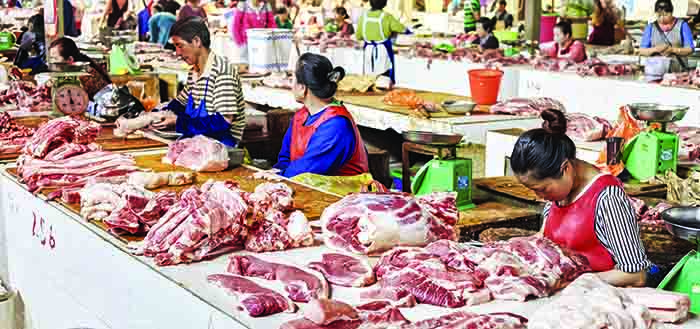In his latest Eastern European update, Russian journalist Vladislav Vorotnitkov looks at Russia’s on-going efforts to break into the lucrative Chinese pork market
Russia’s federal authorities and agricultural tycoons see twin opportunities from the ongoing trade war between US president Donald Trump’s administration and China’s Xi Jinping’s government, as well as African swine fever’s (ASF) spread in eastern China.
Breaking into the Chinese market is a big goal for the Russian pig industry, and despite repeated attempts by veterinary watchdog Rosselhoznadzor, the Agricultural Ministry and large pork producers, pork exports remain barred from entry.
Big sales market
It could be a lucrative market, according to some producers – Viktor Linnik, president of Russia’s biggest pork producer Miratorg, estimated that his company would be able to sell products worth up to US$500 million (£386,000,000) per year to China. The Russian Export Center – a government agency that promotes Russian products overseas – forecasted that the country’s overall meat export could grow nearly tenfold, to 1 million metric tones per year if the Chinese market is opened up.
Yet, while the opportunities looked mouth-watering, China had no interest in importing Russian pork. As long as Russia was fighting ASF and products containing the ASF genome reached supermarket shelves, and China was ASF-free, there was no sense in jeopardizing the domestic industry with buying potentially dangerous Russian pork.
Who’s to blame?
The tables began to turn, however, when the first ASF outbreak was registered in China. Soon after, Rosselhoznadzor claimed European suppliers were responsible for the ASF epidemic in China – pointing to ‘similarities’ between the virus genome in China and in Europe.
The Defence Ministry went further, by claiming a US laboratory sparked the ASF epidemic in Russia. A statement in the Russian Gazette, the government’s official daily newspaper, claimed that the laboratory, located in Tbilisi, Georgia – known as the Lugar Center – is engaged in developing and testing biological weapons. In suggesting a link between the laboratory and the spread of ASF, the Gazettecited documents published by former Georgian State Security Minister Igor Giorgadze. (The US Embassy has denied the accusation, dismissing it as ‘nonsense and typical of Russian misinformation and propaganda’- Ed).
It seems the claims are designed to persuade China that, although Russia has to combat ASF, the European Union and the US are less than ideal trade partners.
Opening niche
Speaking earlier this year, Dmitry Vostrikov, president of the Russian union of food producers Rusprodsoyuz, said that Russia could benefit from the trade war between China and the US and replace some American products on the Chinese retail shelves.
Hopes have been raised of the possibility of China opening up to Russian pork imports, and with good cause. The Chinese Generations Fund has signed a preliminary agreement to invest $600 million into RusAgro’s projects in the Russian Far East – which are not far from the China border. With this money, the partners plan to build several major pig farms.
Alexey Chikunov, the director of the Far East Development Fund, said this was the best time to begin exports, because ASF have outbreaks brought some severe problems to the local pork market in China, while Russia had an ability to provide clean pork products.
RusAgro previously claimed that it would not be expanding its project on the Far East until there were clear export prospects. We are still waiting for any official word that exports are going to be authorised.




